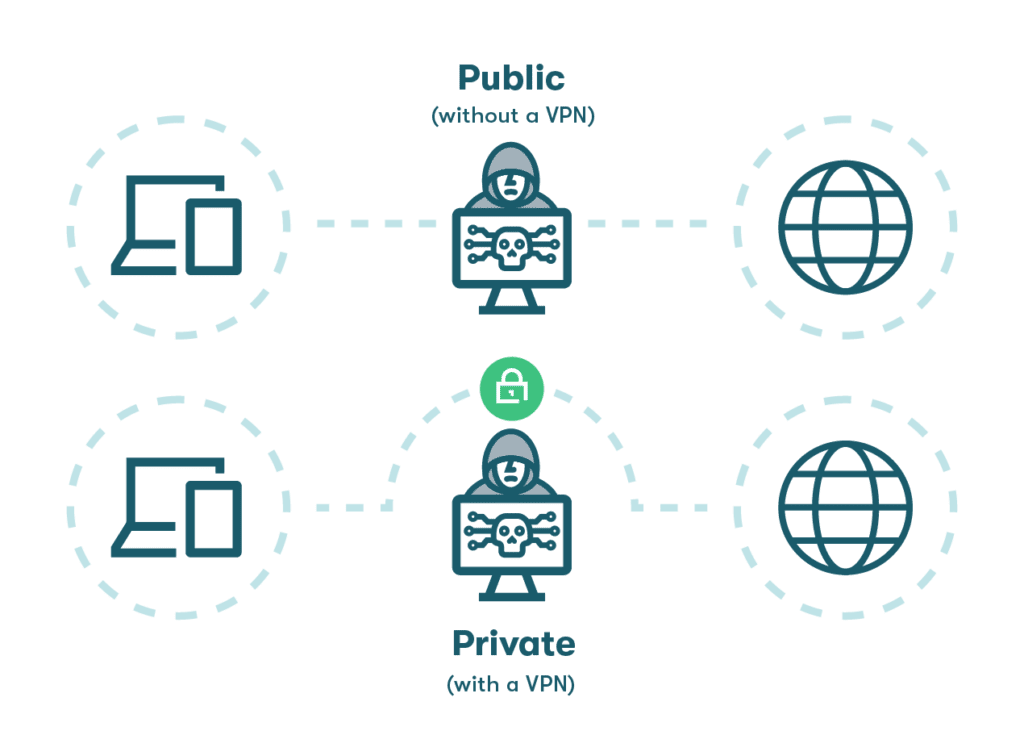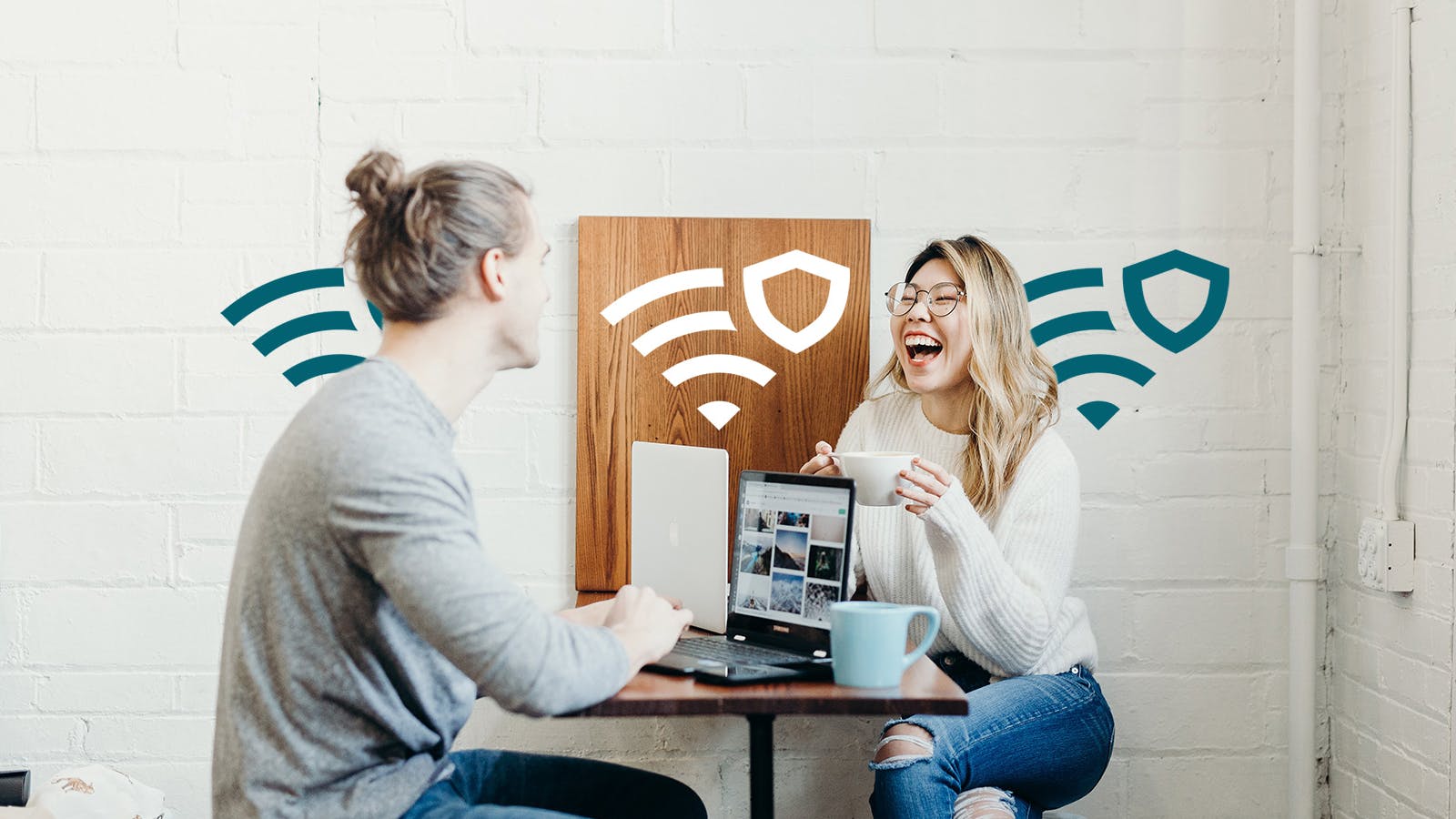We spend a lot of our lives online these days. Whether it’s streaming the latest show, answering emails, scrolling social media, messaging friends and family, or checking our bank accounts, our faces are usually in front of a screen for the better part of the day. (Just ask our Screen Time reports.)
With all this watching, scrolling, and tapping away, a lot of personal data is transmitted. Logging in to various apps and accounts, searching, shopping online—all that data is valuable to advertisers, Internet Service Providers (ISPs), and, more concerningly, cybercriminals.
Protecting your data is an integral part of living a safe, secure life online. And tools like VPNs make privacy a breeze.
Want to make life harder for scammers?
Check out our free username generator and random password generator tools.
Think you have a strong password? Use our password strength tester tool to put it to the test!
What's a VPN?
When you use a VPN (virtual private network), your internet connection is rerouted through a private server. With the VPN acting as an intermediary, your IP address (your computer’s unique ID) is masked, protecting your identity. Any personal data you send while connected is encrypted and transmitted as an unreadable code. In this way, your ISP can’t see the websites you visit, the apps you use, or any of the data you send or receive.
The benefits of a VPN
A VPN has three major benefits:
- It protects you on public WiFi. VPNs let you encrypt unencrypted communications sent to and from your device, so if anyone intercepts your data, it will be unreadable.
- It offers online anonymity. VPNs mask your IP address, location, and activity so you can browse the internet privately.
- It can let you access geo-blocked content. Some VPNs allow you to access content that’s blocked based on your geographical location.
Let’s take a closer look at each of these VPN benefits.
1. Protects you on public WiFi
One of the primary uses for a VPN is staying secure on an unsecured connection, like when you check your bank account using airport WiFi, log in to your streaming service at a hotel, or work from a coffee shop. A motivated, tech-savvy person who’s connected to the same public network could use basic hacking techniques to view your browsing activity and intercept your data. This includes any sites you visit or any information you submit online, like your username and password combinations.
WiFi-hacking isn’t the most common cyber threat—cybercriminals often go for low-risk, high-reward grabs, and hanging out in a coffee shop hoping someone types something valuable isn’t an easy gain. But the risk is there, and your data is worth protecting.
Compromised logins can be devastating, and not just because you could be locked out of that account forever. Just one username and password combination can be a digital treasure trove of personal information for a cybercriminal. Even if that password is only used for one account (which it should be!), the cybercriminal now has easy access to the account and all the information within it. And if you’ve reused that password across other accounts, they’re now all vulnerable: once a cybercriminal has a key, they’ll try it in every door.
How a VPN helps: A VPN encrypts all your unencrypted internet activity, from web surfing to uploads and downloads, preventing your data from falling into the wrong hands.

2. Offers online anonymity
As it currently stands in the U.S., internet service providers (think: AT&T, Comcast, whoever you buy your internet from) can access your data—even if you use Incognito Mode. This data includes your location, search habits, and browsing history, among other things. Laws like General Data Protection Regulation (GDPR) in the EU have cracked down on this, but depending on where you’re located, your personal data could still be collected.
Most people wouldn’t choose to broadcast their online habits to just anyone. But if ISPs are keeping track, you could be doing just that. They could hand that data over to advertisers, the government, or other third parties (more on that here), so it’s important to consider the security implications. Privacy isn’t just for “private people” anymore.
How a VPN helps: ISPs can track and collect this data because your internet activity is connected to your device’s unique IP address. VPNs hide your IP address and encrypt all the data you send or receive so the ISP can no longer see the websites you’re visiting or what you’re searching.
3. Can let you access geo-blocked content
By changing your IP address, a VPN makes it appear to content providers that you’re browsing in another region. This can allow you to access content that may not be available in your current location—although streaming services are often wise to this, so you may still not be able to watch shows from other countries. It’s good to check the streaming service’s terms of service to understand what’s permitted and make sure you’re mindful of any country-specific penalties.
How a VPN helps: VPNs let you choose your server location, so no matter where in the world you are, your online presence can be where you want it to be.
Get a lightning-fast VPN and password manager
Ready to start securing your data with a VPN? We’ve got you covered with our partner, Hotspot Shield.
Hotspot Shield’s Premium VPN lets you browse, shop, and pay your bills online with complete privacy—no matter where you are in the world. It works across your devices and all major platforms (Windows, macOS, iOS, Android, Linux, Smart TVs, routers, and more), and it even comes with 24/7 tech support.
Hotspot Shield is available at no extra cost to all Dashlane Premium customers and Friends & Family admins, as well as anyone who’s on a Dashlane Team or Dashlane Business plan. You can set up your Hotspot Shield Premium account directly from your Dashlane app—just select “VPN” under “Security Tools.”
If you haven’t yet jumped on Dashlane Premium, this is one more reason to treat yourself. With a password manager and VPN for just $4.99 per month, Dashlane Premium is the best-value option to protect yourself online.
If you’re as perpetually online as most people these days, it’s time to start taking steps to secure your data. And setting up a VPN is a simple but mighty step in the right direction. With a VPN working quietly in the background, you can search, watch, and scroll safely without increasing your digital footprint. Your information is safe from prying eyes, and your online activity is yours alone.
Interested in getting a VPN through Dashlane? Get Dashlane Premium today and learn more about our VPN protection.
Sign up to receive news and updates about Dashlane

